When Nyah Gray’s father, Air Force Maj. Walter David Gray was killed in Afghanistan in 2012, she stepped up to help her mother and two younger siblings, including learning how to cook.
She was 8 years old at the time.
“When her father died there was a period where I really entered a downward spiral. It was a very private battle for me,” said Nyah’s mother, Heather Gray Blalock. “Nyah was such a warrior, like her dad. She just did whatever needed to be done to keep us all functioning. She cooked, she helped her siblings with school work, she made sure they were dressed, all at age 8 and 9 and she never once complained about it. …
“When the dust settled, so to speak, our support network went back to life as usual. But Gold Star families know that is when it really gets hard. That’s when the real battle begins,” Blalock said.
“She’ll tell you it wasn’t a big deal, but I know how much she took on for me and her siblings,” said Blalock, who has remarried. “As I got the help I needed to deal with grief properly, things improved, but I’m forever grateful for the way Nyah in many ways held our family together. …
“To have so much maturity as a child is extraordinary. So much of who she is came out of that difficult time.”
Nyah, now 17, is one of eight military children honored as Military Child of the Year by Operation Homefront, in the 13th year of the awards recognizing contributions these children make to their families and their communities. Just like the population of military children at large, this year’s recipients have diverse backgrounds and experiences. They’ve overcome a variety of challenges even before the COVID-19 pandemic, including being separated from their parents during deployments for a large part of their lives.
One youth successfully battled cancer; and another is working to help other children facing the challenges her family did in working through issues of post-traumatic stress. Another helped her school deal with racial unrest by channeling the concerns into productive discussions. All have used their grit, resilience and compassion to make a difference for others, in various ways.
The eight are among 283 nominations from the military community. “All of our nominees this year deserve special recognition as they and their families not only overcame the many challenges inherent in military life, but they did so while dealing with the devastating and disruptive impacts of a global pandemic… a tribute to the strength of our military families,” said retired Air Force Brig. Gen. John I. Pray Jr., president and CEO of Operation Homefront.
A panel of independent judges selected the award recipients based on scholarship, volunteerism, leadership, extracurricular involvement and other criteria.
This year, the number of recipients grew to eight, with the first youth representing the U.S. Space Force. Each youth received a $10,000 grant, a laptop computer, and was featured in a virtual celebration.
The youths have variety of plans for that $10,000, with most planning to use it for college. And they’re all grateful to be representing other military kids with the honor. “A big ‘thank you’ to Operation Homefront. This is amazing to me,” said Liam Cooper, Military Child of the Year for the Coast Guard.
Military Times is the media sponsor for the Operation Homefront Military Child of the Year program.
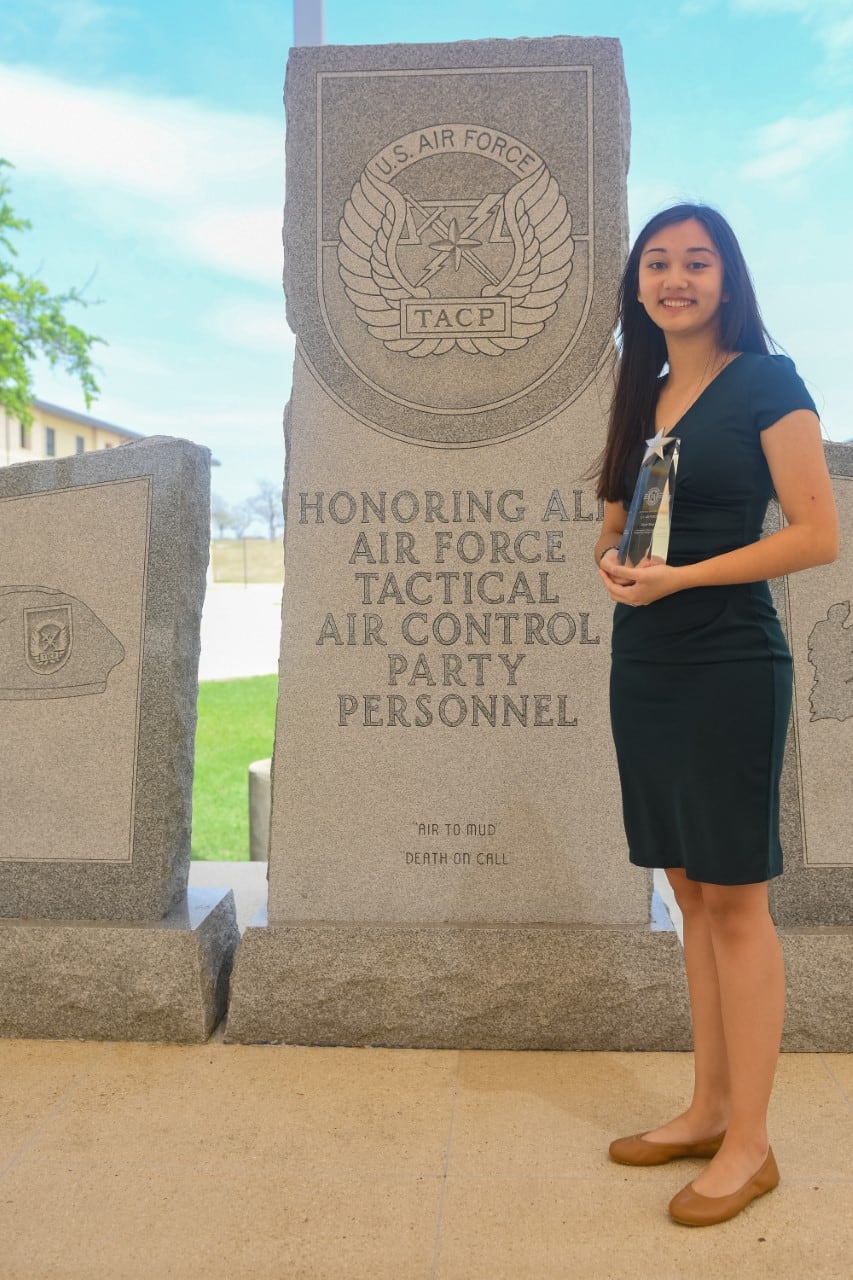
AIR FORCE
Nyah Gray, 17, Buda, Texas
Nyah isn’t sure what motivated her to step up to help her family in such a critical way at the age of 8 when her father, an Air Force tactical air control party air liaison officer, was killed in Afghanistan in 2012, she said.
But she does know that the message her father recorded for her in a “daddy pillow” before he deployed made a big impact. She and her siblings still have their pillows. “In that message, my dad was telling me to help my mom out, be a helper to her. That was always how it had been. I was always naturally inclined to do that.
“My whole life I just wanted to help any way I could, and I loved being around her and my dad, and helping with my siblings and everything. It was a natural thing for me at that point to just kind of slide into that role. …. I just felt like it was definitely what my mom needed. She needed a break.”
Piano, art and academics became her outlets, and she excels at them all. She founded Key Change, a ministry that restores pianos destined to be discarded, and donates them to schools and nursing homes for music therapy programs. She was recognized as a NASA Texas High School Aerospace Scholar, is a member of Mu Eta Sigma national math honor society, and participates in the North American Computational Linguistics Olympiad.
Through the many moves with her father and stepfather, now-retired Air Force Col. Jack Andrew Blalock, she’s also developed a passion for learning languages and studying cultures. She’s not sure yet where that will lead her, but she’s considering the missions route and Bible translating, or working with the CIA.
Her stepfather, “has done a lot of great things,” she said, such as going to the Dominican Republic to help build hospitals and schools. “He’s helped contribute to an entirely different military experience for me, because my biological dad was more in the thick of things in the field, being in special ops,” she said.
“Growing up I thought everyone was just right in the thick of combat all the time. … It’s really awesome to know that there are different routes and different opportunities for people to take in the military.”
Her advice for military kids: “Cherish every moment of the experiences you have. There are definitely going to be good times and bad times. Take them both together, but cherish all the experiences you’ve had in the past. Look forward to the future and savor every moment in between.”
Her advice for military parents: “Stay strong. As my biological dad used to say: ‘finish strong.’ There’s definitely a lot of commitment that comes with being in the military. Even just with being with your family, balancing work and family, moving around and everything. Military parents definitely have one of the greatest jobs I can think of … they’re amazing at what they do.”
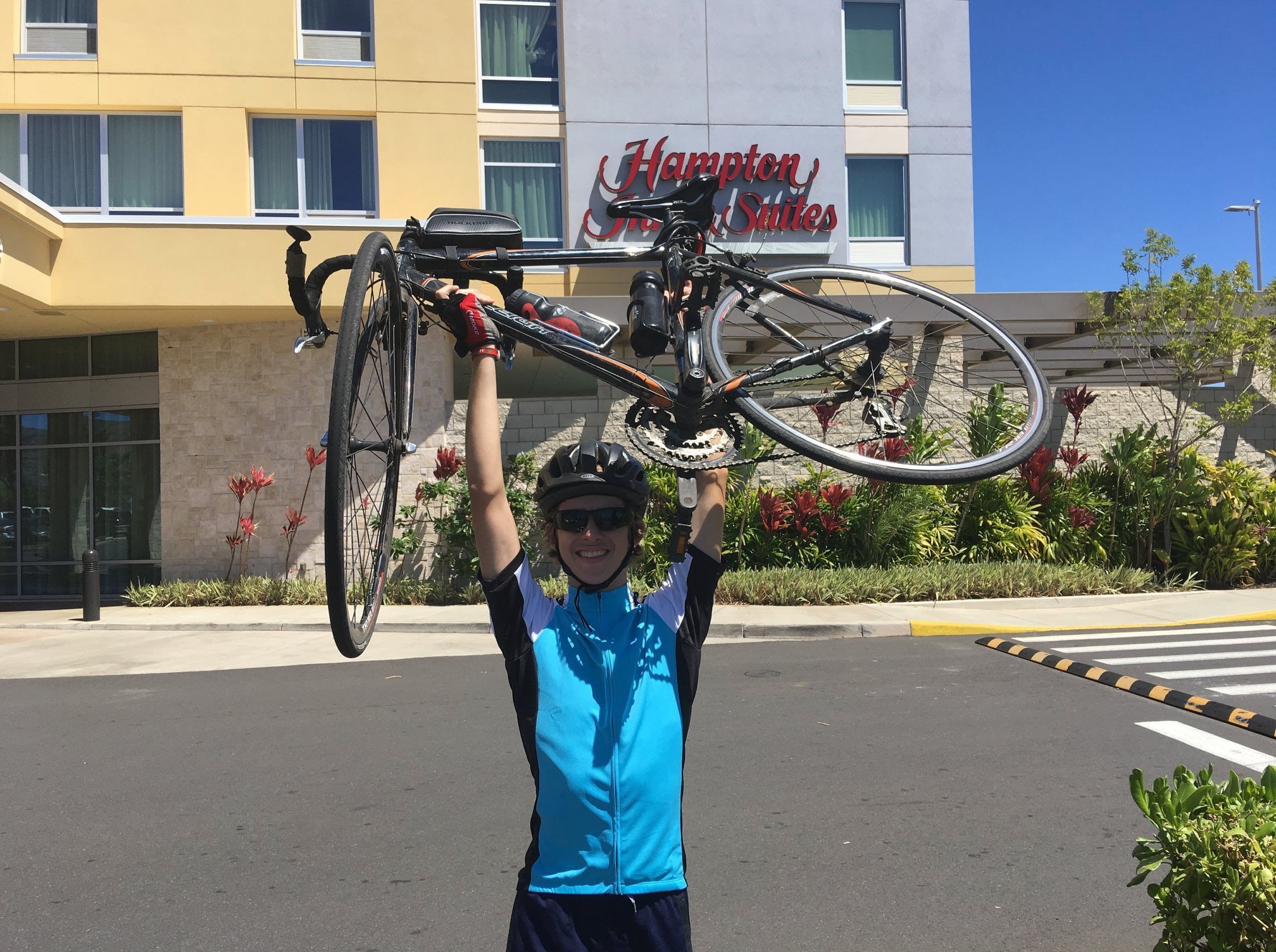
ARMY
Caleb Pipes, 18, Kailua, Hawaii
One of Caleb Pipes’ most important accomplishments, he says, was successfully battling cancer. He was diagnosed at age 14 when his family was living in Nepal, while his father, Army Col. Greg Pipes, was stationed at the U.S. Embassy in Kathmandu. His mom Lindsay moved Caleb and three of his siblings to California for his cancer treatment.
A big part of that success was his family and friends, and his faith, he said. In California, there were lots of relatives and friends rallying around and helping take care of him. “There was lots of providence from all around,” he said, including a pastor who was also a cancer survivor.
He spent his first day of high school in an infusion chair in the oncology wing of Valley Children’s Hospital in California. At age 16, a year after completing treatment, and following several scans showing no evidence of cancer, Caleb and his father rode around the island of Oahu on a 135-mile, three-day bike ride. “I was blessed to have a full recovery,” he said. The last day of the bike ride, his friends came to congratulate him.
Caleb is a senior at Wilson Hill Academy, an online Christian classical school headquartered in Austin, Texas, which he attended from Nepal, to California, and now Hawaii.
An Eagle Scout who helped build an outdoor toy chest for children at the Fisher House at Tripler Army Medical Center, Caleb is a certified scuba diver, just earned his black belt in karate, is an avid pianist, and spent 30 days trekking in the Himalayas with his family.
His lifelong fascination with the ocean and interest in robotics play into his career aspirations, as he hopes to study mechanical engineering and one day design and program aquatic robots.
Caleb was on a robotics team while he was undergoing cancer treatment. “It was rewarding to see this little hunk of metal you’ve been cutting and wiring for months, and see it perform and do what you want it to do,” he said. He plans to attend Grove City College in Pennsylvania in the fall.
His parents are impressed by Caleb’s positive leadership, said Col. Greg Pipes. “He sets not only an example for others to follow, but also a positive tone. He happily tackles new challenges and embraces opportunities. His siblings look to him and follow that model. As a son, a brother, a scout senior patrol leader, Sunday school teacher, or Honor Society president, Caleb infects every organization he leads with a passion for excellence and fun.”
Caleb said that battle with cancer prepared him a little for the pandemic. “It made me realize there’s really nothing you can do about the future … the future will be what it will be. Not that you shouldn’t prepare for it, but it’s going to throw you curve balls. That’s just how life works. So let tomorrow worry about itself. I’m not going to stress over what’s going to happen tomorrow. …. I was able to get through COVID by focusing on today and letting tomorrow worry about itself.”
His advice for military kids: “Take hold of the constants,” he said, which for him is his family and his faith. “When everything is changing, you need something to hold onto.”
His advice for military parents: “Make time to focus on the family. Family is super important for military kids. Family is a constant. Our family is very intentional about spending time together, doing things together. Strengthen that core and that will help you weather the storms.
“Prioritize experiences over things,” he said. When the family is overseas, they take advantage of that. “My country count is now 23 countries. … We’re making experiences together.”
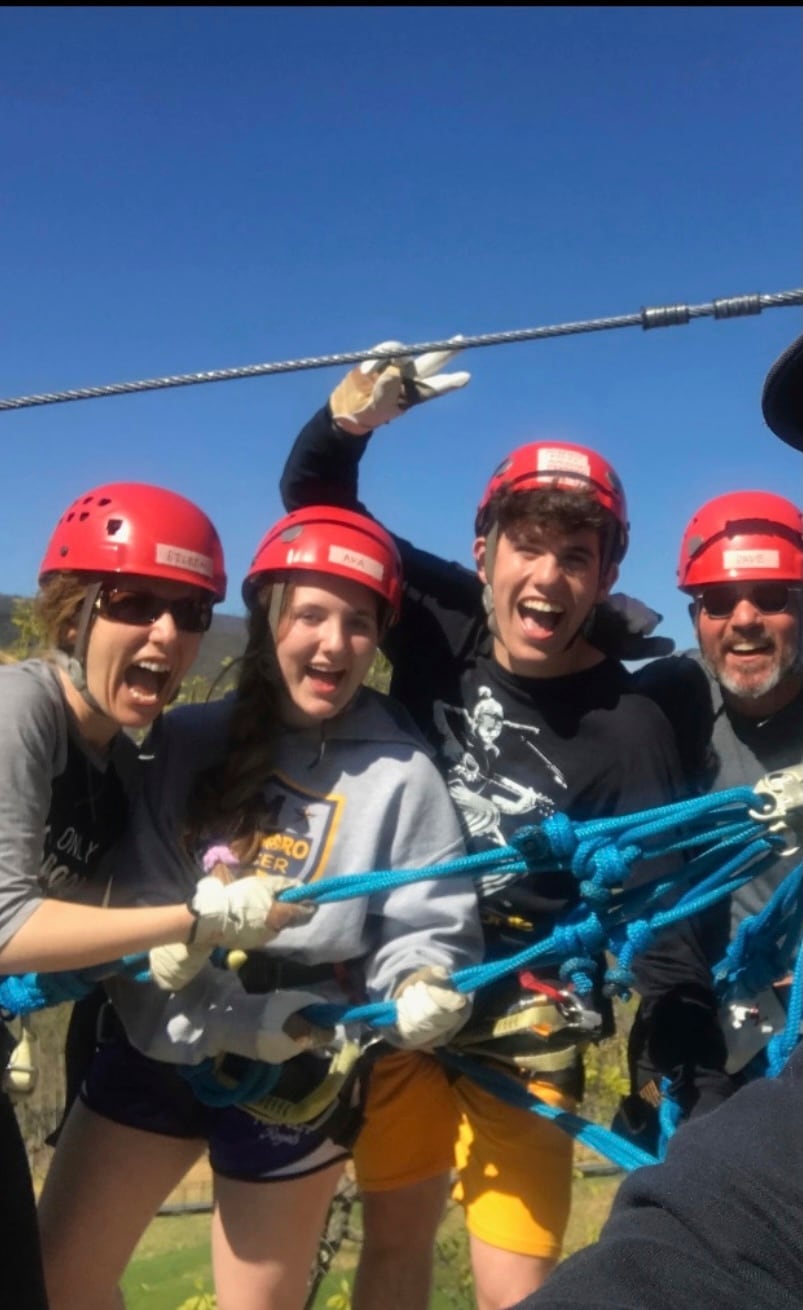
COAST GUARD
Liam Cooper, 18, Port Jefferson, New York
Liam Cooper has plenty of accomplishments under his belt, from leadership roles in clubs, to captain of the varsity soccer team and co-captain of the tennis team. But most meaningful for him is his work raising money for Wreaths Across America.
That effort, where he worked with school administrators to organize the campaign, raised more than $2,700.
Doing that was important for two reasons, he said: his family’s military heritage includes two grandfathers and an uncle who served, and his father is retired Coast Guard Capt. David Cooper. “Giving back to veterans who made the ultimate sacrifice is an amazing feeling, because I love giving back to my community and helping out. And this time, it felt personal for this cause.”
But he also wanted to raise military awareness at his school in Port Jefferson, New York. “My sister and I are the only military kids in the school district,” he said. “It helped raise awareness of veteran and military life in my school district.”
It was an interesting experience moving to a school where everyone had grown up with each other since kindergarten. he said. “Coming out of military life to civilian life. … It takes time, but I’ve made the best of friends. I love it here.”
Liam’s mother Eileen said her son “really stood out at every school he attended. He was always recognized for his leadership by classmates and teachers as far back as elementary school. Teachers would seek me out to tell me how impressed they were with him, especially how kind he was to everyone. … but for all of the achievements and recognition Liam has received through the years, knowing we raised a son with good morals and character means more to me. Liam has a huge heart that makes him shine!”
Liam is considering pursuing a career in nonprofit management or government service as an environmental lawyer.
He already has some experience in that regard, including his volunteer work as the co-manager for Bottles for Change, a nonprofit organization that collects glass bottles and converts them to decorative lights and olive oil dispensers, to keep them out of landfills. Their effort raised over $1,000, despite the pandemic. Bottles for Change was inspired by the pandemic, he said, because of the increase in environmental pollution. “That was something positive that grew out of COVID,” he said.
His advice for military kids: “In times of deployment, or when you’re feeling lonely, just know that other military kids have gone through this,” he said. “We build the support system. To have that common ground, to know other military kids, and build lasting friendships. They always have your back. Know you’re not alone, and look at the positive side.”
And for those making the transition to civilian life: Realize it takes time. “For me, coming out of the military life into civilian life, it definitely presented some challenges. I moved to a school district where everyone knew each other…. It was interesting to get to know them. It takes time, but I’ve made the best of friends here.”
His advice for military parents: “My parents are the best parents I could ever ask for. … Just always be there for them. … You’re their support system,” he said. In the summer, when people are hanging out with friends and going to the beach, military kids may not have those friendships, yet, because they may have just moved, he said. “Make sure you have each other’s back and you’re each other’s support system. That’s what my parents did.”
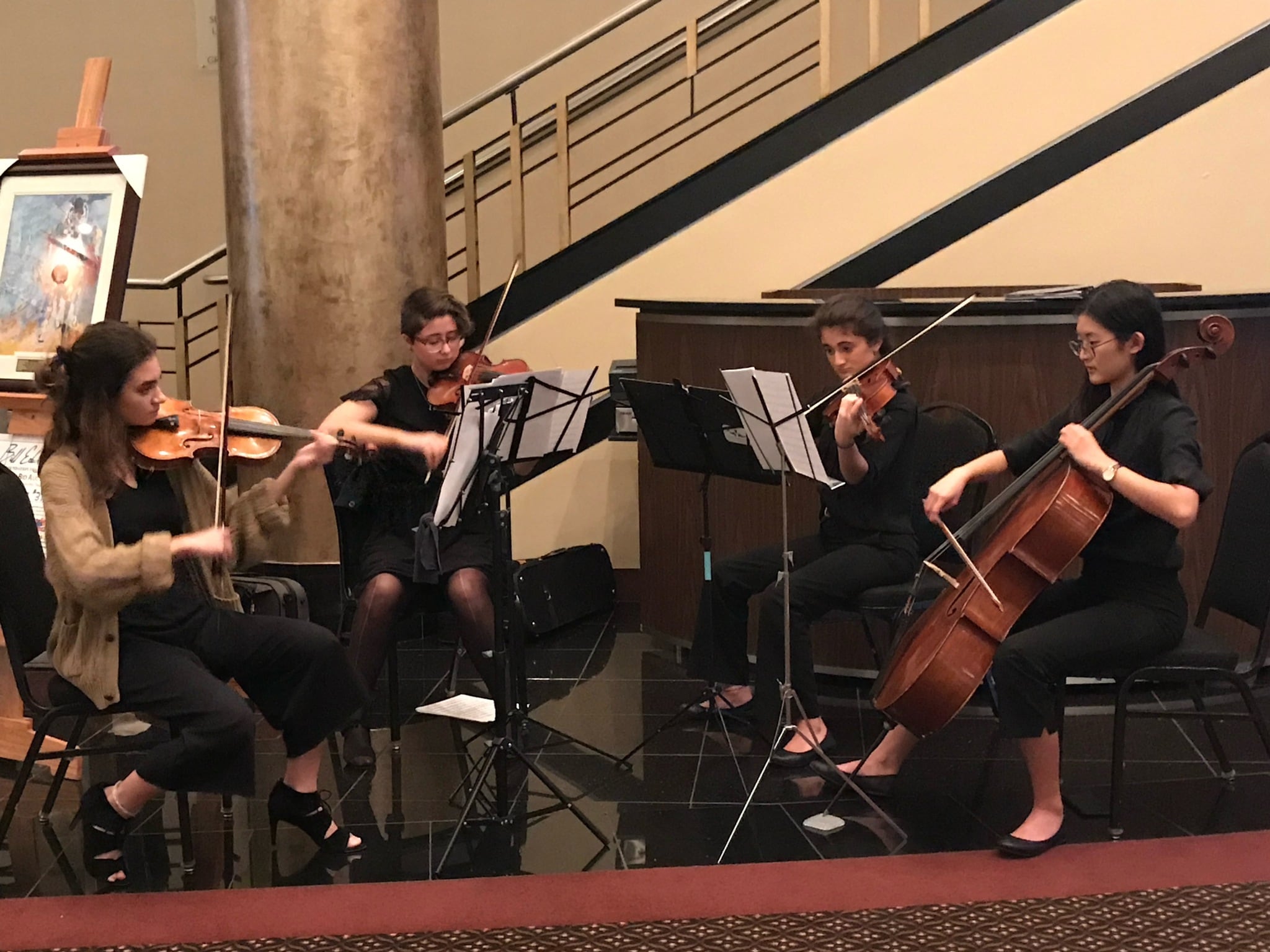
MARINE CORPS
Eleanor David, 18, Falls Church, Virginia
As the pandemic shut down the country, Eleanor David was taking numerous Advanced Placement classes in her junior year, so she was studying for all the AP exams. It was a completely new, online format adapted by the College Board, in order to accommodate students during the pandemic.
She managed to get the highest possible score on all her exams, so she’s proud of being able to adapt to that situation.
Eleanor is the daughter of Medha David and Marine Corps Col. George David, commanding officer of the Marine Corps Cyberspace Warfare Group based at Fort Meade, Maryland.
The pandemic has been difficult for her, just as it has been for millions of other students. But the flexibility and adaptability she’s developed as a military kid has helped. “Usually when we move, we get kind of a heads up and we know when it’s going to happen, and sort of the duration of everything. For me, the hardest part of the pandemic is the uncertainty,” she said. “But in terms of day-to-day life, I’ve definitely been able to adapt, in a way, because I’ve had the experience of my life radically changing in only a couple of weeks” as a military child.
Eleanor has used her skills to help others adjust in the pandemic. She’s a chemistry and math tutor at her school, and helped develop virtual tutoring sessions in chemistry and calculus. She also helped her music shop employer write a grant for locally funded COVID assistance.
Music has provided an avenue for connecting with other students through her family’s moves — seven in her lifetime. She realized her passion for the violin after she was forced to take a break as her broken wrist healed following a bike accident in December 2015.
Eleanor has performed as principal violinist and violist in her schools’ orchestras and in community groups. She also excels in academics and on the soccer field. The interest in music and science were the foundation of her winning project in the 2020 virtual Fairfax County Science Fair, where she conducted a study of the mechanics of sound production in string instruments. She plans to study chemical engineering and viola performance in college.
Her parents are impressed by her determination, said her mother Medha. “Especially since she started high school, we feel she’s been fostering this in all her endeavors and carefully planning a path for herself to attain the goals and objectives she’s set for herself, in her musical studies, in academics, applying to colleges and so much more.”
Her advice for military kids: “Try to appreciate the ways in which we have more life experience than we might have if we all just stayed in one place. I think a lot of times when moving we think about only the negative and what we’re losing, but we should also be thinking about the qualities that we’re gaining in terms of adaptability and strength and focus. It’s really important to remember that even when we lose opportunities due to moves, we gain some, too.”
Her advice for military parents: “Recognize the troubles don’t end when the last box is unpacked. A lot of people assume that people can adjust pretty quickly, the way parents can in the military, to these situations. But in my experience it takes at least six months for the school and the community to feel like home.”

NATIONAL GUARD
Elise Puliafico, 18, West Bridgewater, Massachusetts
The resilience and leadership Elise Puliafico has developed over the years is her most important accomplishment, she said, and her father’s deployments had something to do with that.
She’s experienced a cumulative 60 months of deployments of her father, Army National Guard Lt. Col. Joseph Puliafico, including his 10-month deployment to Afghanistan in 2014 to 2015.
“Obviously, when my dad deployed, I had to become more resilient, and through that I just became a stronger person,” she said. For him to be overseas in the middle of war, she said, “it was a really scary time for me when I was 12.”
During that time, Elise was worried about both parents, as her mother Lynette developed dangerous complications from routine surgery that resulted in an extended hospital stay.
And when her father returned from deployment, she learned about post-traumatic stress. “A lot happened that he didn’t want to talk about,” she said. “It made adjusting when my dad came home an interesting time for my family, because we were trying to learn about PTSD at the same time.”
As a result, she’s working on a project to help prepare other military children for this possibility before their parents or guardians come home, she said.
The pandemic has changed her perspective and helped her grow, she said, especially as she considered the struggles of other people in comparison to her own. “It helped me put my life in perspective, look at things that were going on for me and think, ‘Maybe this small thing isn’t such a big deal.”
That perspective spurred her to run a holiday toy drive for local military families.
“On my own, I knew that I would be able to run the toy drive and make sure the toys were clean and everything was sanitized. I just wanted to benefit any military families near me who were in need,” she said.
Lynette Puliafico said her daughter “is one of the most humble individuals that we know. She will give everything she has to another person or project, but never wants the spotlight on herself. She also has incredible integrity. Elise always stands up for what is right while being sensitive to others’ feelings and opinions.”
Elise has been captain of varsity field hockey, tennis and debate teams at West Bridgewater Middle/Senior High School. She’s a member of the National Honor Society and Spanish Honor Society; treasurer of her class; and an advocate for teens in various capacities, including the National Guard Teen Panel.
Her advice to military kids: “Get connected with other military kids and youth groups for military kids. With the National Guard, it’s also very different because we’re very spread out across the state, so there aren’t a ton of military kids in my immediate area. I didn’t have really many military kid friends when my dad was deployed,” she said. But when he returned, she got involved, “and met all these kids who had the same experiences I’d had, and could really understand …. and could offer advice and share stories.”
Advice to military parents: “Be very understanding of what your kids are going through, especially if it’s not something you experienced in your childhood. My mom was always really good about that, asking how my sister and I were feeling, being there for us as a good support even though it was a difficult time for her, too. She always made sure I got connected, too,” Elise said. “Help your kids find that network where they can connect and bond with other military kids.”
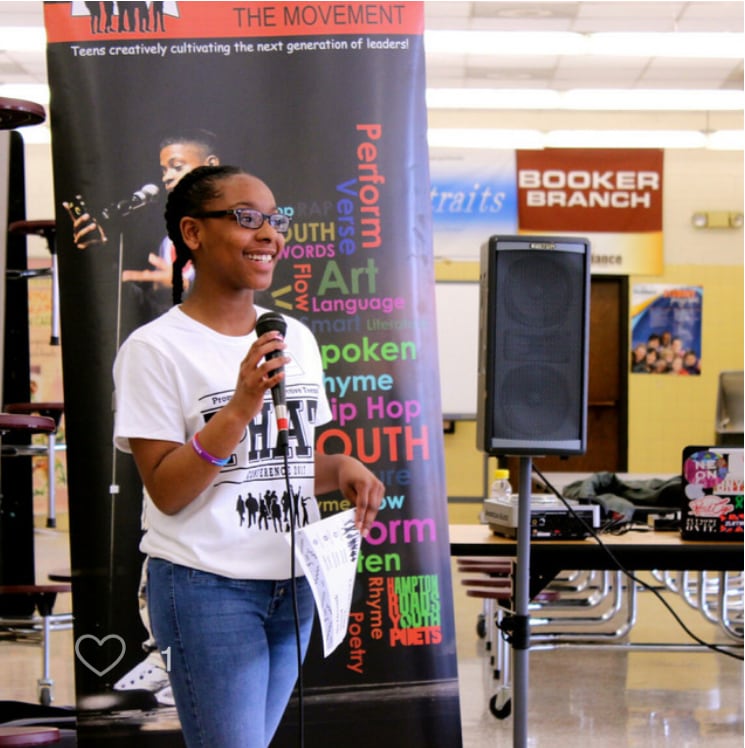
NAVY
Dasia Bandy, 18, Chesapeake, Virginia
For Dasia Bandy, the military lifestyle has been a bit different from the traditional journey. She and her siblings have never made a permanent change of station move.
“I tell people all the time, there’s more than just the military people who move all the time,” said Dasia, a freshman studying international affairs at The George Washington University. “The military community is very diverse, very inclusive, with a lot of different types of youths who have different experiences, and not all our experiences are necessarily the same.” The most common thing that military children experience is loss, she said. “Someone is always leaving.”
Her father, retired Navy Operations Specialist 1st Class Lee Bandy and her mother, Dayna, a career social worker, made a pact not to move after the children were born, Dasia said. Growing up, her father moved frequently, although his family wasn’t military. “He knows the impact of constantly moving, and he didn’t want that for us.”
Dayna Bandy said her daughter Dasia “is known in our home as the analyst, as she is always researching and motivating others to live their best life. She loves helping others, as she views that as her obligation or duty in life. … She is a humble leader.”
Dasia was active in the youth center at Norfolk Naval Shipyard, and was named Boys & Girls Clubs of America’s National Military Youth of the Year in 2019. Her roots in the Norfolk community helped her provide needed information to other military youth new to the area. “I was able to show people around … I was able give everyone the go-around tips and tricks.”
While OS1 Bandy was on active duty, Dasia, her mom Dayna and her three younger siblings experienced a cumulative five years of his deployments, and Dasia helped out with extra responsibilities such as cooking and cleaning, getting her siblings ready for school and overseeing their homework.
She’s excelled in academics, served as a student leader, and competed with her school’s varsity gymnastics team, and logged about 1,000 hours of volunteer time last year. But her most important accomplishment, she said, is her work in starting the multi-cultural club in 2019 in her junior and senior years, in response to a traumatic racial incident at the predominantly white school.
“Looking back retrospectively, I’m just so happy we were able to come together as a student body and it didn’t necessarily end in an extreme, drastic way,” she said. She hosted open lunchtime discussions where students, administrators and guidance counselors talked about the incident, and a range of topics. Because of those long, productive discussions, she requested approval to form the multi-cultural club.
The discussions, and the ensuing club “really helped it go in this new direction, because certainly students were ready to riot and things of that nature,” Dasia said.
She wants to continue to have an impact, through advocacy, and empowering and educating young people about holistic health, with the elements of physical, mental, social, spiritual and financial well-being. She’s on her way to launching a career as a public servant, which began with her aspiration of becoming president, at the age of 7. “Someone told me the president of the United States is in charge of the military, and I said, ‘My dad’s in the military. Hmmm….. Oh, I can do that, and make my dad come home.”
She’s since expanded her reasons for wanting to be a public servant, and is taking a step at a time.
Her advice for military kids: “Your service member will be in the service for however long. … Just know they won’t be doing that forever, but you will always be their child.”
Advice for military parents: “Sometimes give us space. And the best advice, whether service member or spouse, is to find something that can be a constant, a consistency within your family.” For example, her busy family made it a point to have dinner together. “My mom realized there was something that needed to stay the same. Ending our day with having dinner together once a week, no matter what was going on, that night out of the week where we sat down and reflected on our week. … You need to reflect on how your day was or your week was, and get those emotions out, good or bad.”
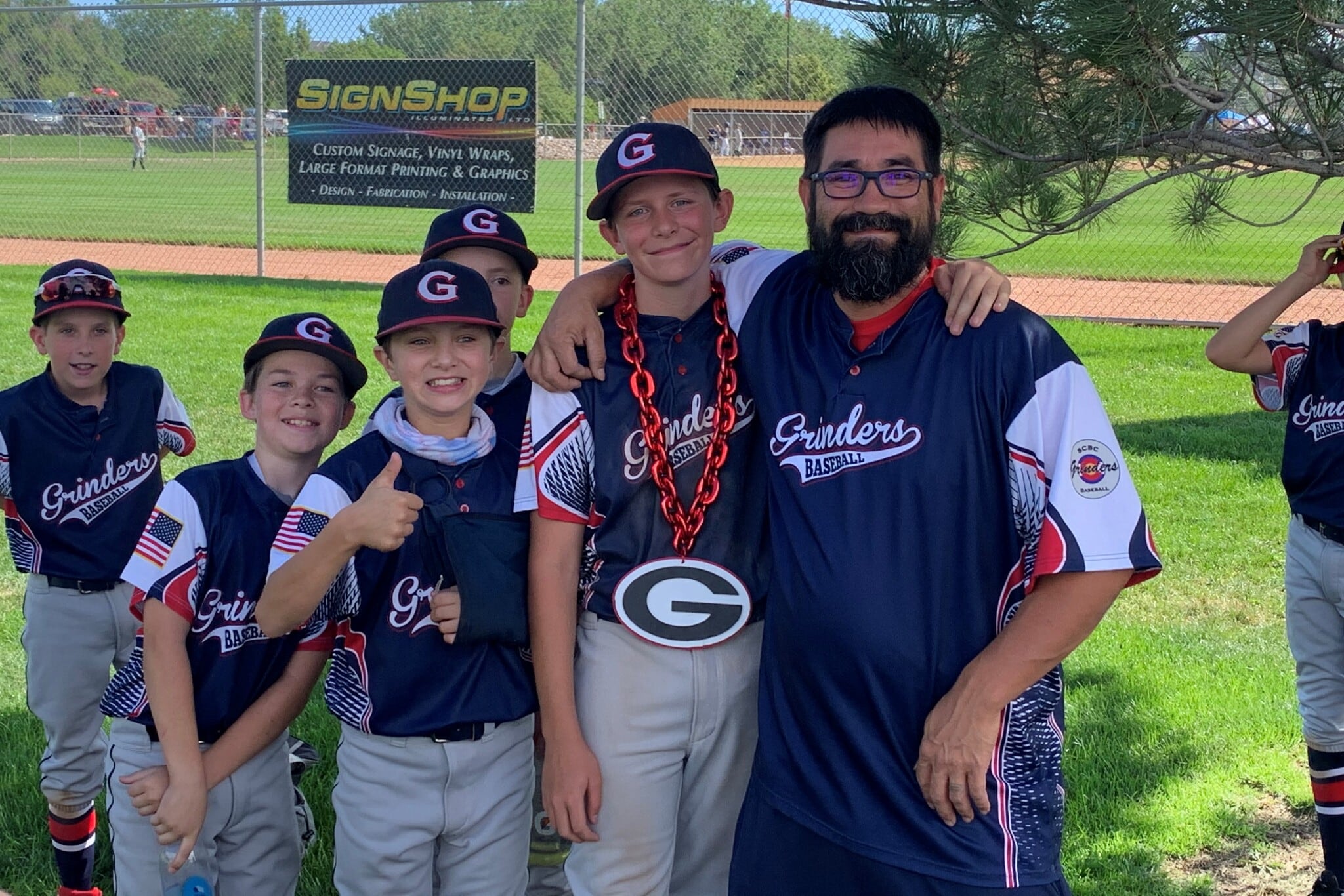
SPACE FORCE
Joshua Wouden, 13, Colorado Springs, Colorado
For 10 of his 13 years, Joshua Wouden has played baseball, throughout the family’s four moves. His development in the sport is an important accomplishment for him, says Joshua, whose favorite positions are pitcher and first baseman. And that baseball connection has been an important part of adjusting to new locations.
Joshua is the son of Space Force Maj. Derek Wouden and Joy Miel Wouden. Given his family’s military heritage, one of his proudest moments of being a military child was being there when his father was commissioned into the new Space Force. “It was an amazing feeling,” he said. “Being there knowing he was going to be part of history. He was going to be one of the first members of Space Force, protecting satellites and helping us with our everyday lives, as well as protecting our country.”
His mother Joy said people comment about how much older Joshua behaves than his 13 years. “Josh has always had a keen sense of observation, a focus on kindness, a higher level of spiritual maturity, a balanced sense of priority and a strong desire to just be good, besides just being really smart. …
“He has always been such a blessing to me as my firstborn, in helping with the family when his dad works long hours or when I am down with a migraine, practically and just keeping my spirits up. But when there is something he wants for himself, he works for it. He doesn’t take the easy road to get by, in sports, in school, or in any other endeavor,” she said.
Josh is the oldest of five children, and is in the gifted and talented classes at Timberview Middle School in Colorado Springs. He’s skipped ahead two grades in math, and participates in Science Olympiad. He volunteers with his church’s young men organization, in efforts such as service projects for ward and community members.
At the beginning of the pandemic, his father was working 24-hour shifts, and during that time his mom was having a lot of migraines, he said. On those days, he helped his younger siblings get breakfast, and get started in school, and helped his mom get her medicine and herbal tea. “I kind of just helped them get through the needs of the day,” he said.
Like most other youths in the country, he had to adapt to changes in school and activities during the pandemic. But he said it helped him develop problem-solving skills, and to focus on the bright side of things. “I found time to reflect on the important things in life,” he said.
His advice for military kids: “Military kids know moving is hard. It’s heartbreaking to leave the people you love. Help your parents. That will help you. Help your family. Kids and parents should “help each other through it.”
His advice for military parents: “Based on what my parents do for me, get your job done, do what you need to do. Do what your kids need, especially in moving. My dad for sure did that for me. As soon as we got here, he got me into activities. Figure out ways to make it comfortable for everybody. …
“The older I get, the more I realize what military members do for our country. … I’m thankful for what everyone in the military does.”
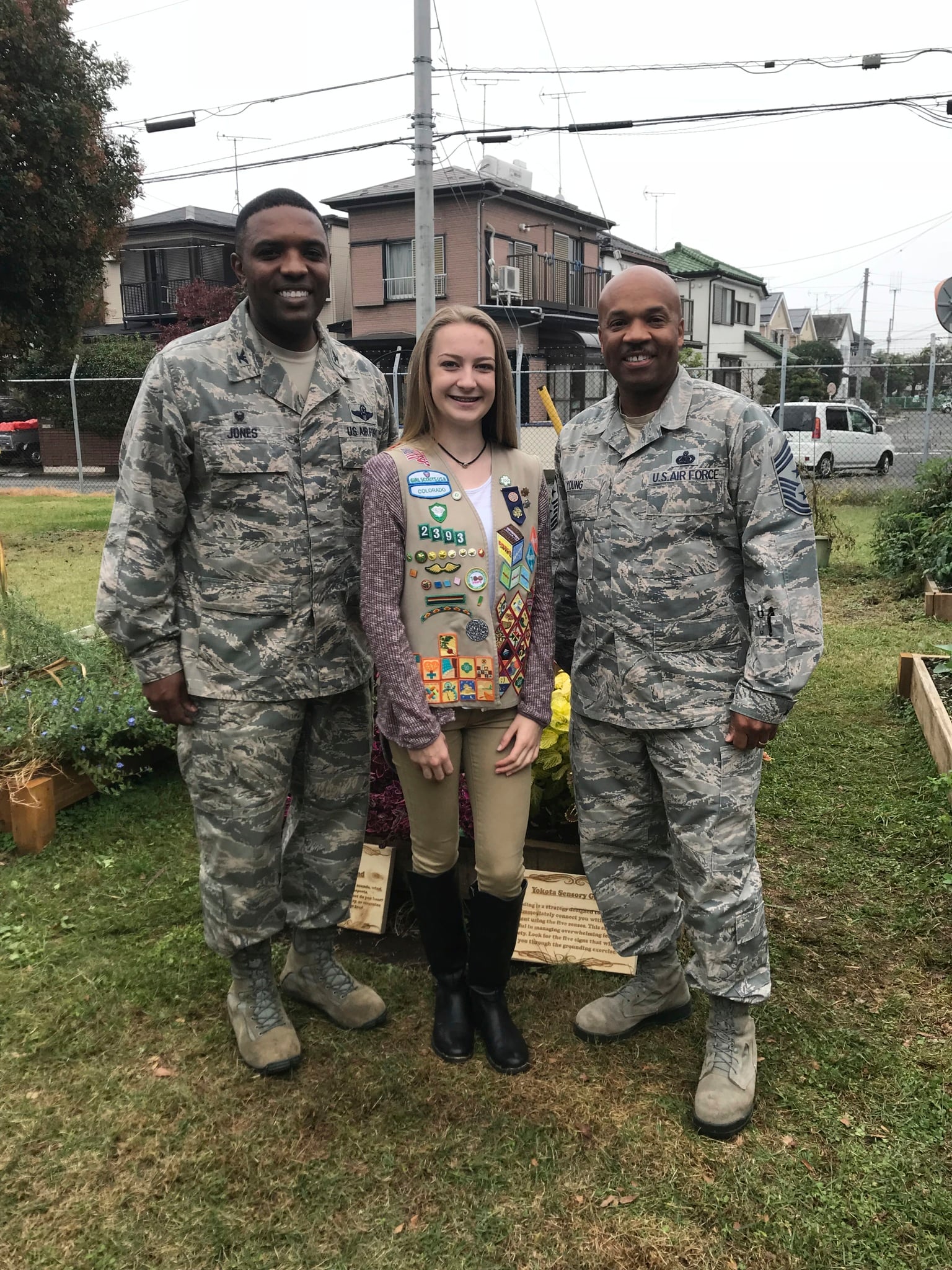
INNOVATION
Emma Remley, 18, Papillion, Nebraska
Long after Emma Remley left Japan, people at Yokota Air Base are still visiting the sensory garden she created in 2018.
Her father, Air Force Chief Master Sgt. Jeremy Remley, is now stationed at Offutt Air Force Base, Nebraska.
Emma came up with the idea for the garden, which measures about 8 feet by 4 feet, after experiencing anxiety when her father deployed for five months while they were at their previous duty station in Colorado. The garden was part of her application for her Girl Scout Gold Award.
The garden, which is inside a larger community garden for fruits, vegetables, flowers and herbs, features wooden signs that guide visitors through exercises to experience touch, sight, sound, smell and taste with the plants. As Emma writes on her Yokota Sensory Garden webpage, she used the grounding technique, a strategy using the five senses that can help manage overwhelming feelings or intense anxiety, and deal with major changes.
“As a military child, change is ‘normal,’ so I have learned to use some of the techniques… to help me make it through the more difficult times. These came from moving to overseas bases like Japan and Germany, having my father deploy, keeping our family ‘mission ready’ but not forgetting to take care of ourselves with some ‘down time’ also,” she writes.
“I wanted to see how I could use what I learned when he was deployed, to help other people,” the 18-year-old said. Since she left, the American Red Cross has been nurturing her garden.
In addition to her involvement in Girl Scouts for the past 12 years, earning her Bronze, Silver and Gold awards, she’s been involved in sports, including varsity and competition cheerleading at one of her high schools, and has participated in marching and varsity band. Her main instrument is clarinet, but she’s picked up percussion, and plays the piano. She’s always taken honors and AP classes, and has been a member of the National Honor Society since her sophomore year.
She’ll attend West Virginia University in the fall to study forensics and investigative science.
Lydia Remley describes her daughter as “a very humble young lady who really cares for other people and their feelings. She has been described by many of her teachers to have an ‘old soul’ because of the time she takes to think through problems, how she approaches her schoolwork, and how she carefully interacts with her peers.”
Her advice for military kids: “Definitely just keep an open mindset. That’s really helped me a lot, because the second I start closing my mind to new ideas … it’s never a fun experience. But when I start reaching out and getting involved in my community, seeing what that new location has to offer for me, it’s been a lot more fun and exciting.”
Her advice for military parents: “Be there, and just check in,” she said. Her parents made sure she was settled into her school, and found activities in the community to get her involved. But also make sure the child has a good, stable household to come home to, she said, “because everything else can change so quickly. Having that really strong family has really been helpful to me.”
Karen has covered military families, quality of life and consumer issues for Military Times for more than 30 years, and is co-author of a chapter on media coverage of military families in the book "A Battle Plan for Supporting Military Families." She previously worked for newspapers in Guam, Norfolk, Jacksonville, Fla., and Athens, Ga.




